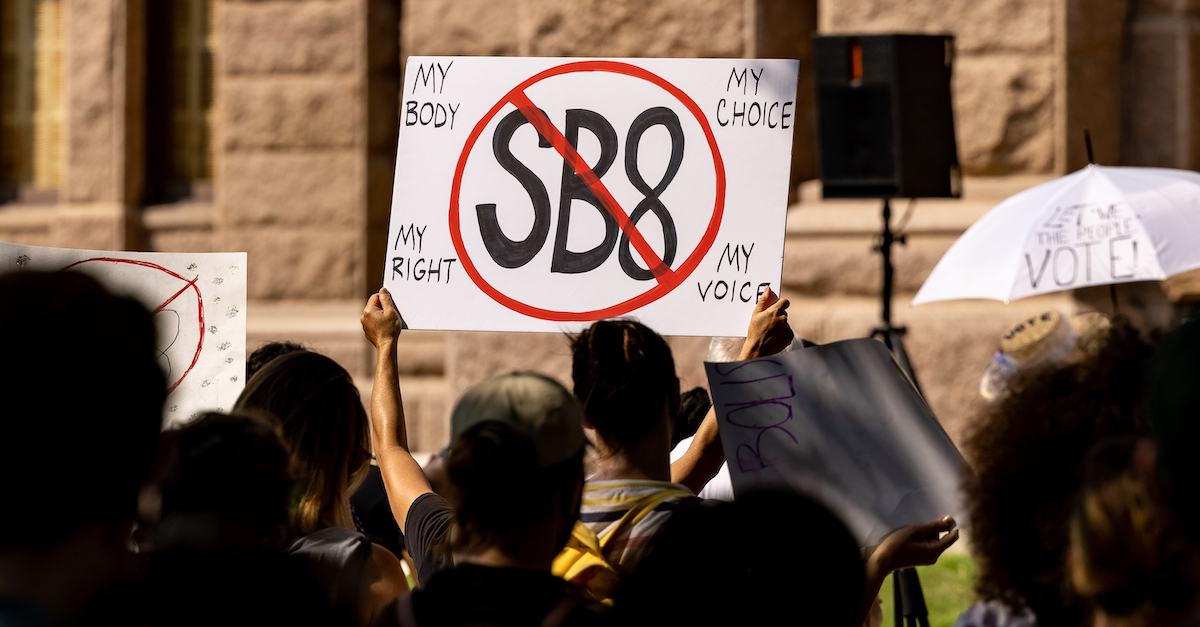
Abortion rights activists rallied at the Texas State Capitol on September 11, 2021 in Austin, Texas.
The State of Texas on Monday asked a federal judge to hold upcoming hearings in person — and not remotely — in a lawsuit filed by the U.S. Department of Justice over the Lone Star State’s recent near-ban on abortions after six weeks of pregnancy. The DOJ has not objected to the request.
From the state’s motion:
The hearing is currently set for hearing via Zoom. The State of Texas (State) respectfully requests the opportunity to appear in person to present argument and evidence. Counsel for the State have conferred with plaintiff’s counsel, and plaintiff’s counsel indicated they take no position on the State’s request.
Texas says the hearing should be in person for “at least two reasons.” The first is because “issues with Zoom presentations have been well-documented during the pandemic and include issues hearing the proceedings, disadvantages associated with the digital capabilities and resources of the respective parties, the increased work for Court staff, and issues with decorum and formality.”
“Those issues can be alleviated completely by holding the October 1, 2021, hearing in person,” the state said.
The second reason Texas wants an in-person hearing is because of the “complexity and novelty of the issues at play in this litigation.”
“The hearing will be more efficient if the parties can communicate clearly and directly with the Court and can present argument and evidence without any hurdles caused by operating through a virtual medium,” the state continued.
The attorneys for the state also suggested that the challenges posed by the COVID-19 pandemic were “serious,” but then said “those concerns are generalized and not specific to any party to this litigation.”
“In fact, City and County leaders have recently reported that Austin and Travis County are within the threshold to reduce the current COVID-19 restrictions within the area,” the state added. The motion concluded:
Holding this hearing in person will eliminate the well-documented downside risks of conducting litigation by computer, it will benefit the Court through a more efficient hearing, and lastly, the generalized risk of COVID-19, as demonstrated by recent trends in the County, are waning and pose no specific, identified risks. Accordingly, the State of Texas respectfully moves the Court to enter an order allowing parties to attend the October 1, 2021, hearing in-person, if they elect that option.
Also on Monday, the DOJ moved to seal in their entirety the videotaped depositions of five individuals in connection with the matter to “protect a party or person from annoyance, embarrassment, oppression, or undue burden or expense.”
“Career civil servants have a legitimate privacy interest in limiting permanent and public dissemination of video recordings of them being deposed; they reasonably expect that they will not be subjected to video-recorded, publicly disseminated cross-examination about the way that they carried out their routine job functions,” the DOJ argued. “And the public availability of the transcript of such depositions satisfies any public interest in their contents.”
A hearing to determine whether a preliminary injunction should be issued against the Texas abortion law is scheduled for Friday morning.
The DOJ announced on Sept. 9 that it would challenge Texas S.B. 8, a law which effectively bans abortions after embryonic cardiac activity is detectable by a doctor. Generally, that occurs about six weeks into pregnancy. The Texas law is legally unique because it allows private individuals the right to enforce the law through civil litigation against abortion doctors and others who assist women in terminating their pregnancies. The State of Texas claims that makes the law virtually impossible to challenge in court — a legal posture the DOJ and others find dubious.
Read some of the recent court papers below:
[Image via Jordan Vonderhaar/Getty Images]
Have a tip we should know? [email protected]